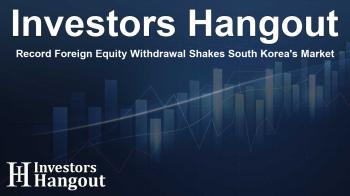Record Foreign Equity Withdrawal Shakes South Korea's Market

South Korea's Capital Market Faces Significant Foreign Withdrawals
Recent trends reveal substantial foreign divestment from South Korea's capital markets, with December experiencing the largest outflow since early 2020. This situation has been attributed to a rise in political uncertainty that has affected investor trust and market stability. According to the latest data from the central bank, foreign investors sold off a net total of $2.58 billion from the South Korean stock market, extending a streak that has now lasted four consecutive months.
Impact on Equity and Bond Markets
The decline in investment isn't confined to equities alone. For the first time in nine months, foreign investors also turned net sellers in the bond market, resulting in an additional outflow of $1.28 billion. This combined outflow of $3.86 billion marks the most significant retreat from South Korea's markets since the challenging period of March 2020, when the global economy was grappling with the initial impacts of the COVID-19 pandemic.
Significant Currency Depreciation
Last month, the South Korean won experienced a notable decline, depreciating by 5.2% against the US dollar. This marked the most considerable drop in over 22 months, further fueled by the political landscape, particularly after President Yoon Suk Yeol announced a brief martial law on December 3, causing increased anxiety among investors and market participants.
Understanding the Broader Economic Context
These outflows highlight a significant shift in market sentiment, driven largely by factors beyond typical economic indicators. The investor community's reactions to political developments underscore the sensitivity of financial markets to governance issues and stability. As South Korea's capital markets continue to face challenges, the future direction of foreign investment will likely depend on the resolution of these political uncertainties and the overall economic environment.
What Lies Ahead for South Korean Markets?
The sustained trend of foreign selling could pose further challenges for the South Korean economy, particularly if market sentiments do not improve. Analysts are monitoring the situation closely, as continued outflows could lead to tighter liquidity conditions and increased volatility in the financial markets. Investors are keenly looking for signs of stabilization that could restore confidence and reverse the current trends.
Frequently Asked Questions
What caused the outflow of foreign investment in December?
The primary driver of the significant outflow was heightened political uncertainty in South Korea, combined with investor sentiment reacting to recent governmental actions.
How much did foreign investors pull from South Korean stocks?
Foreign investors sold off a net total of $2.58 billion from South Korean stocks during December.
What impact did the political situation have on the South Korean won?
The political turmoil contributed to a 5.2% decline in the South Korean won against the US dollar, marking its largest drop in over 22 months.
Are foreign investors also withdrawing from the bond market?
Yes, foreign investors transitioned to net sellers in the bond market for the first time in nine months, contributing to a net outflow of $1.28 billion.
What does this mean for the future of South Korea's economy?
The sustained outflow signals potential challenges ahead for South Korea's economic stability and investor confidence, which may require attention to governance and policy issues.
About Investors Hangout
Investors Hangout is a leading online stock forum for financial discussion and learning, offering a wide range of free tools and resources. It draws in traders of all levels, who exchange market knowledge, investigate trading tactics, and keep an eye on industry developments in real time. Featuring financial articles, stock message boards, quotes, charts, company profiles, and live news updates. Through cooperative learning and a wealth of informational resources, it helps users from novices creating their first portfolios to experts honing their techniques. Join Investors Hangout today: https://investorshangout.com/
Disclaimer: The content of this article is solely for general informational purposes only; it does not represent legal, financial, or investment advice. Investors Hangout does not offer financial advice; the author is not a licensed financial advisor. Consult a qualified advisor before making any financial or investment decisions based on this article. The author's interpretation of publicly available data shapes the opinions presented here; as a result, they should not be taken as advice to purchase, sell, or hold any securities mentioned or any other investments. The author does not guarantee the accuracy, completeness, or timeliness of any material, providing it "as is." Information and market conditions may change; past performance is not indicative of future outcomes. If any of the material offered here is inaccurate, please contact us for corrections.
